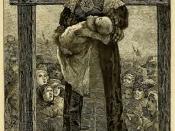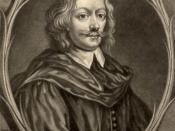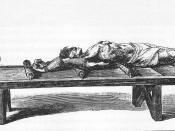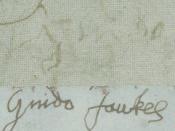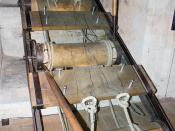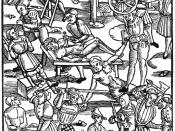Nearly every story that has ever been written has a hero. In Nathaniel Hawthorne's novel The Scarlet Letter, the character of the hero is played by Roger Chillingworth. Although in the novel he portrays himself as a sort of villain through his ambitions to torture Dimmesdale, his villainous prospects ultimately have an effect on the Reverend Dimmesdale which frees his conscience and readies his soul for redemption at the hands of God. Acting as the key part in preparing Dimmesdale's soul for forgiveness, essentially freeing it from enrapture in eternally unforgiven sin, makes Chillingworth the hero in the sense that he is Dimmesdale's savior.
From the moment that Roger Chillingworth arrives in the New England town, he holds nothing but animosity toward what his wife has done. It is because of his wife's sin that his initial goal is to uncover the identity of the father of Hester's illegitimate child Pearl.
However, once he discovers that the perpetrator is the priest, who is also both his patient and roommate, his motives become twisted and his mission becomes one of blatant revenge. It is thus that Chillingworth embarks upon a conquest to torture Dimmesdale psychologically to the fullest extent of the human capacity for pain and grief, and maybe beyond. However, the doctor is not the only one who seeks to torture Dimmesdale. His frail, sickly physical state is due to the Reverend's physical self-punishment. Although both men strive to torture the same person, it is not evident that either man realizes the glorious redeeming aspect of this torture that has yet to come.
Although Chillingworth is seen by the other characters in the novel as a dark, evil, demonic figure, he shares similar traits with God as well as with Satan. The very prospect of torture can clearly be associate with Satan. But take, for example, God's omniscience. There seems to be no secret idea or thought of any kind in the novel that Chillingworth does not know. He knows about Pearl's father, about Hester's oath, about Dimmesdale's scourging of himself. The one thing he does not have an exact knowledge of is the fact that God is using him as a tool; but he even seems to have knowledge of the possiblity of this idea when his "old faith, long forgotten, comes back to me, and explains all that we do, and all we suffer...Ye that have wronged me are not sinful...neither am I fiendlike...It is our fate." (156) Although Chillingworth does not know his exact role, he realizes that he is not necessarily evil, and that what has transpired and has yet to transpire has done so according to some greater plan, including even his torture of the Reverend Dimmesdale. Chillingworth seems to understand that there is a higher power at work, perhaps even with a plan in store for the torturer and his victim..
The only person to fully realize that Chillingworth's diabolical torture of Dimmesdale ultimately prepares him for forgiveness at the hands of God, thus making Chillingworth a hero, is Dimmesdale himself. He realizes this conflict between intention and actual result when he is near the end of his earthly life, when he tells Hester that God "is merciful! He hath proved his mercy in my afflictions. By giving me this burning torture to bear upon my breast! By sending yonder dark and terrible old man to keep the torture always at red heat!" (234) Dimmesdale is well aware of the fact that Chilingworth has tortured him with the intent to make every waking moment his life an agony within itself. But only through such pitiless torture, a magnitude of which can be achieved solely with the passionate hatred which fuels vengeance, could Dimmesdale have been effectively brought to such a state of penance which would allow him to be forgiven by God and by himself. Although he does this deed unwittingly, Chillingworth prepares the Reverend for forgiveness and perhaps passage to Heaven. Saving Dimmesdale's soul earns Chillingworth the title of hero, for there are few more heroic things can we do in this world than save the life or soul of a fellow man.
Chillingworth's mission from his arrival in their town had been to seek revenge, but in his pursuit of revenge, he accidentally became something more than he expected, or wanted. He became a tool in the redemption of a human soul, and in doing so, became a hero. Having acheived something which so vastly outranks petty vengeance as heroism, having in fact acheived a loving brotherhood with his quarry, is nothing less than remarkable. Perhaps it should be called a miracle. Then, it must also be remembered that the Lord works in mysterious ways.
